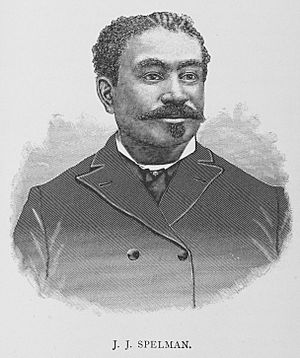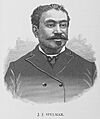James J. Spelman facts for kids
Quick facts for kids
James J. Spelman
|
|
|---|---|

Spelman in 1887
|
|
| Born | January 18, 1841 |
| Died | May 25, 1894 (aged 53) |
| Occupation | Journalist, politician |
| Political party | Republican |
James J. Spelman (born January 18, 1841 – died June 25, 1894) was an important journalist and politician. He lived and worked in both New York and Mississippi. Early in his life, he was a journalist and helped put on stage shows in New York City. During the American Civil War (1861–1865), Spelman worked to encourage African Americans to join the army. After the war, he moved to Mississippi. There, he continued his journalism and served for six years in the state government.
Contents
Early Life and Career
James J. Spelman was born in Norwich, Connecticut, on January 18, 1841. His father was a pastor in New York City for over 30 years. James went to public schools in Connecticut until 1855. Then, he moved with his family to New York City.
In 1859, he started working with newspapers. He delivered and sold them. He also began writing for the Weekly Anglo-African newspaper. Later, he wrote for its follow-up paper, the Pine and Palm. In New York, he met many famous journalists. He also helped create a drama group. He organized stage shows with Elizabeth Taylor Greenfield. One show in April 1862 raised money. It helped improve land given to formerly enslaved people.
Helping During the Civil War
When the Civil War began in 1861, many African Americans wanted to join the army. James Spelman was one of them. But at first, only white men were allowed to be soldiers. Spelman joined a group that tried to form a Black army unit. It was called the Fremont Legion, but it was never accepted.
Later in the war, Spelman helped recruit Black soldiers. He worked with men from New York City schools. They formed a group called the "Shaw Cadets." Spelman was chosen as a Major for this group. The name "Shaw Cadets" honored Robert Gould Shaw. Shaw was famous for leading Black soldiers in the Second Battle of Fort Wagner. The Shaw Cadets performed several times. However, they were not officially made part of the Union Army.
Spelman also helped others in the Black community. For example, he helped Perry Douglass, who was the half-brother of Frederick Douglass. In 1867, Perry and his family arrived in New York City. Spelman paid for their trip to meet Frederick in Rochester. Frederick Douglass later said it was a very emotional meeting.
Journalism and Politics in Mississippi
In 1868, Spelman moved to Mississippi. He was helped by Rufus L. Perry and the African Civilization Society. There, he worked as a teacher for the Freedmen's Bureau. This organization helped formerly enslaved people.
Serving in Government
In July 1869, Spelman was appointed as a justice of the peace. He also became an alderman (a city council member) in Canton, Mississippi. When Mississippi rejoined the United States in 1869, Spelman was elected. He became a member of the Mississippi House of Representatives. He represented Madison County.
Spelman served in the state legislature for six years. He led the Committee on Corporations. He was also a member of the Judiciary and Ways and Means Committees. He gave important speeches, including one about a Civil Rights Bill. Spelman was also a leader in the Colored Conventions Movement. This movement worked for the rights of African Americans. He was a vice-president at a national convention in Washington, D.C., in 1869.
Spelman worked closely with Mississippi Governor James L. Alcorn. The governor made him an aide. He was given the rank of lieutenant-colonel in the state militia. Later, he was promoted to colonel.
Newspaper Work
In the 1870s, Spelman helped start a newspaper called the Jackson Colored Citizen. He started it with James D. Lynch. In 1870, he also worked as a special reporter for the New York Tribune. That same year, Spelman was elected vice-president of the new Republican Press Association. Later in his career, Spelman edited the Baptist Messenger. He also wrote regularly for other newspapers. He sometimes used pen names, like "Private L. Overture."
Education and National Politics
In 1871, the state legislature created Alcorn University. Governor Alcorn appointed Spelman to its board of trustees. Spelman was then elected as the secretary of the board.
Spelman was a delegate to the 1872 Republican National Convention in Philadelphia. He was chosen to be a presidential elector. In 1873, Adelbert Ames became governor. Spelman was appointed to his staff. He became an assistant commissioner for immigration. In 1876, he was again a delegate to the 1876 Republican National Convention. He supported Rutherford B. Hayes for president.
President Hayes offered Spelman a job as a consul in the Dominican Republic. But Spelman turned it down. He instead took a job as a special agent for the post office in St. Louis, Missouri. In 1881, he was suggested for the position of Secretary of State of Mississippi. However, Democrats blocked his appointment.
In 1884, he became superintendent of education for the American Baptist Home Mission Society in Mississippi. But he left that job within a year. He went to work for the colored exhibits department of the World Cotton Centennial in New Orleans. He was also a commissioner at this big exhibition.
Spelman was also involved in local education. He was secretary of the city school board in Jackson. Later, he was appointed as a U.S. Timber Agent. But he resigned in 1890 due to poor health. In 1892, Spelman started a newspaper called the Standard. It supported the Republican Party.
Other Activities
James Spelman was a strong supporter of prohibition. This was a movement to ban alcohol. He was a member of the National Temperance Society. He was also involved in freemasonry and the Kings of Labor.
He joined the Baptist church in 1853. He was president of the Baptist State Sabbath School Convention. He was also the first Sabbath School missionary for the American Baptist Publication Society in Mississippi. He served as recording secretary of the Foreign Mission Convention. He also chaired the National Baptist Temperance Committee.
Family and Death
In 1870, James Spelman married Anna D. Lavender. She was from Jackson, Mississippi. They had four children together.
Spelman passed away on June 25, 1894, in Jackson, Mississippi. He was buried the next day.
Images for kids
 | Kyle Baker |
 | Joseph Yoakum |
 | Laura Wheeler Waring |
 | Henry Ossawa Tanner |


